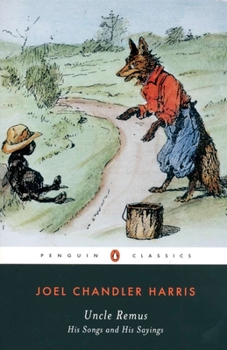Uncle Remus: His Songs and His Sayings
Select Format
Select Condition 
Book Overview
The dialect, lore, and flavor of black life in the nineteenth-century South is portrayed as it appeared to Georgia-born Joel Chandler Harris in Uncle Remus's "Legends of the Old Plantation." For more than seventy years, Penguin has been the leading publisher of classic literature in the English-speaking world. With more than 1,700 titles, Penguin Classics represents a global bookshelf of the best works throughout history and across genres and disciplines. Readers trust the series to provide authoritative texts enhanced by introductions and notes by distinguished scholars and contemporary authors, as well as up-to-date translations by award-winning translators.
Format:Paperback
Language:English
ISBN:0140390146
ISBN13:9780140390148
Release Date:September 1982
Publisher:Penguin Publishing Group
Length:224 Pages
Weight:0.35 lbs.
Dimensions:0.5" x 5.2" x 7.8"
Age Range:18 years and up
Grade Range:Postsecondary and higher
Customer Reviews
3 ratings
Fascinating part of American history
Published by Thriftbooks.com User , 18 years ago
I found this book to offer a piece of American history which has since been lost. The author meant to tell a tale based on life as it was in the late 1800's in the US. Great tales that were told by others and that the author himself simply repeated.
Unparalled story craftmanship
Published by Thriftbooks.com User , 18 years ago
I have just finished this book. It was a delight. Uncle Remus is one of the most alive characters ever to be portrayed in literature. Now, this is coming from someone who has read Conrad, Doctorow, Carrol, D.H. Lawrence, Robertson Davies, and many other engaging storytellers. Somehow, Uncle Remus resonated with me across the 120+ years since it was written. The simple concept of a free slave mentoring a plantation owner's boy by masterful storytelling is pure magic and often heart-warming. For anyone young at heart, this book is a must.
Rough Going for modern readers, but....
Published by Thriftbooks.com User , 18 years ago
Most people today know of how the White Georgian Joel Chander Harris was fascinated by the "rabbit stories" of Black slaves he met at a Georgia plantation in the 1860s, thus eventually leading to this book in 1880. While it's justly famous for the "Brer (brother) Rabbit" stories (BTW-Harris was not the first to record these tales from ex-slaves, Abbie Christensen did that in Port Royal, SC in 1874), it's mighty rough for the modern reader. For one thing, the "Negro dialect" used by Harris is almost incomprehensible to today's reader. Additionally, "Uncle Remus' views on education for Blacks (not in favor) and black advancement, as well as his occasional use of the "n-word" will make this tough to swallow in these PC times. One has to remember when this book was written and get past all that to see the actual beauty and importance of these tales. PS-Be warned that if you like the original edition with the wonderful illustrations of Brer Rabbit in overalls smoking a pipe and of the background scenery and other animal charachters, none of these charming illustrations appear in the Penguin version-just so you'll know.






